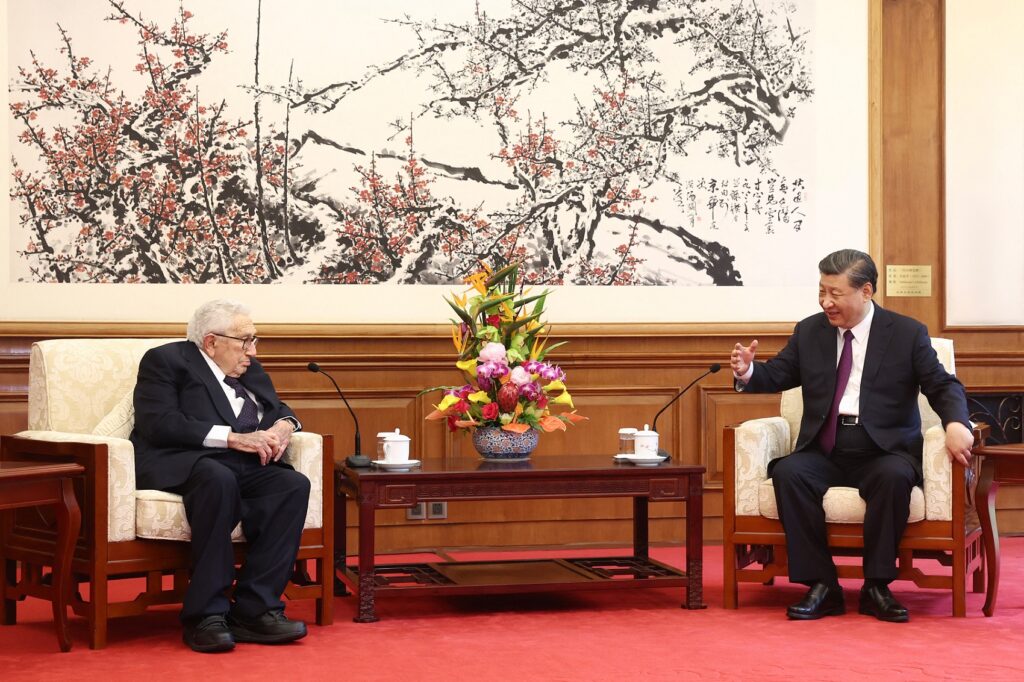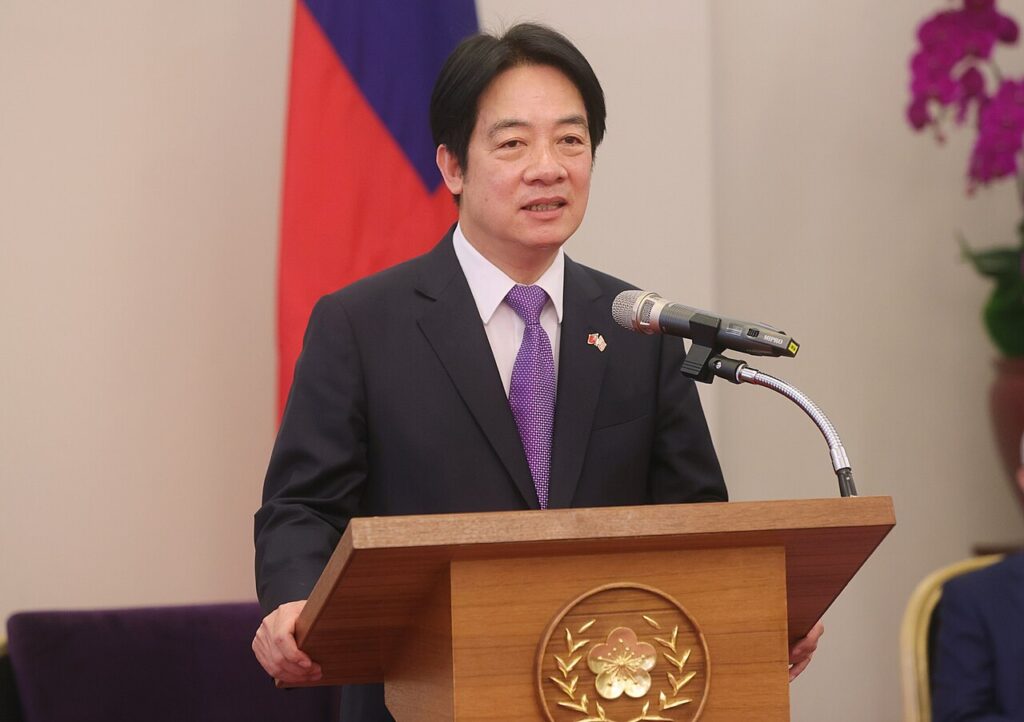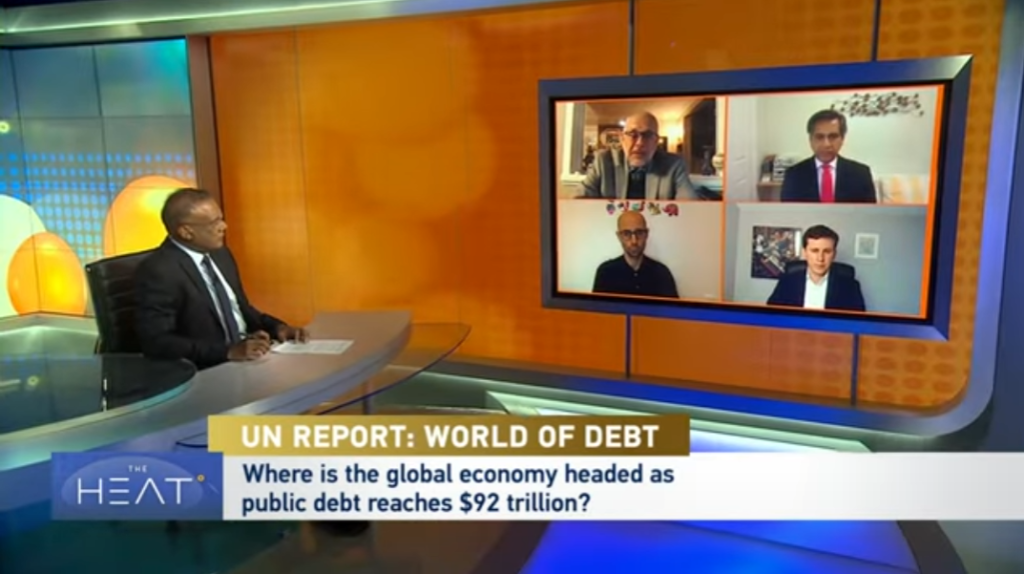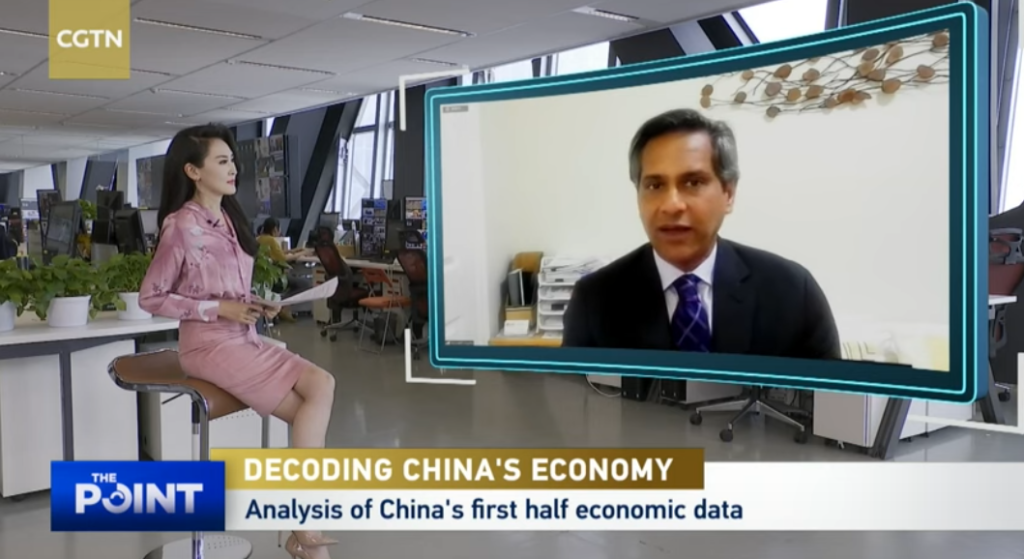
ICAS Bulletin (online ISSN 2836-3418, print ISSN 2836-340X) is published every other week throughout the year at 1919 M St NW, Suite 310, Washington, DC 20036.
The online version of ICAS Bulletin can be found at chinaus-icas.org/bulletins/.

– Pew Research released the results of a recent poll asking Americans which country they believe to be the greatest threat to the U.S.; 50% of the participants named China.
– U.S. and European officials are growing increasingly concerned about China’s push into producing older-generation semiconductors, which have not been sanctioned, following the White House’s implementation of controls over the industry making newer models.
– Analysts believe that, under China’s current business standards, China should be able to enter into the trans-Pacific trade pact, but due to political turmoil it is preventing them from entering.
– U.S. Treasury Undersecretary Jay Shambaugh reaffirmed the Biden administration’s unwavering plans to utilize targeted actions against China to defend human rights, and U.S. and allied security interests.
– U.S. Secretary of State Antony Blinken has continued to urge the Chinese government to seek methods with North Korea to rein in their hostile nuclear program, saying that if China continues to not take action to decrease North Korean aggression, the U.S. will take action. Meanwhile, analysts predict several potential geopolitical shifts in East Asia related to China’s decision on North Korea.
– Secretary Blinken visited the Indo-Pacific to open a new Tongo embassy and to reaffirm U.S. connections to allied partners New Zealand and Australia as Chinese influence continues to rise in the region.
– The U.S. State Department has endorsed a report by the special rapporteur of human rights, stating that China has been exporting arms to Mymanar’s military which was subsequently used to assist and arm the 2021 coup.
– The Chinese government has agreed to use countermeasures following CIA Director William Burns’ statement that the agency was rebuilding spy networks within mainland China.
– The Chinese spy balloon that flew over the U.S. in February has exposed serious shortcomings within the surveillance defense system according to General Glen VanHerk, head of NORAD.
– U.S. Ambassador to China Nicholas Burns, along with hundreds of thousands of U.S. government emails, fell victim to high-profile hacking from Chinese hackers who accessed email accounts and private documents.
– Recent U.S. visits to China have come under scrutiny following the review of the Chinese balloon incident from congressional officials.
Associated News References:
“Biggest hurdles to China entry into trans-Pacific trade pact are political,” Reuters, July 31
“US, Europe Are Growing Alarmed by China’s Rush Into Legacy Chips,” Bloomberg, July 21 [Paywall]
“Half of Americans polled see China as the biggest threat to the U.S., says Pew Research,” CNBC News, July 27
“US willing to take ‘targeted’ actions against China for national security, Treasury official says,” Reuters, July 27
“As US urges China to rein in North Korea, Beijing’s reluctance to act could backfire, analysts say,” South China Morning Post, July 26 [Paywall]
“US Dismisses China’s Rejection of UN Accusations of Arms Transfers to Myanmar,” VOA News, July 25
“China vows countermeasures after CIA chief William Burns says agency is working to rebuild spy network,” South China Morning Post, July 24 [Paywall]
“If China fails to intervene in North Korea, US will take action, says Antony Blinken,” South China Morning Post, July 22 [Paywall]
“Chinese spy balloon exposed gaps in U.S. ability to detect threats, NORAD commander says,” NBC News, July 21
“U.S. Ambassador to China Hacked in China-Linked Spying Operation,” The Wall Street Journal, July 20 [Paywall]
“US diplomacy push after Chinese balloon incident comes under bipartisan fire at House panel,” South China Morning Post, July 19 [Paywall]

– Chinese technology companies are struggling to combat the increasing import restrictions placed on them from the U.S. and allies, and as a result are facing economic and productional challenges.
– U.S. microchip manufacturer Intel has decided to increase its business in China by opening a new innovation hub located in Shenzhen.
– The Biden administration is planning to further limit U.S. technological investments in mainland China with new controls set to be released in mid-August.
– The U.S. government is looking to hunt down and remove Chinese spyware that they believe to be located within power infrastructure that feeds power to U.S. military bases both within the U.S. and abroad.
– On July 26, the United States’ FBI released warnings about Chinese companies stealing U.S.-developed AI technologies, and utilizing them for their own gains.
– U.S. Secretary of Commerce Gina Raimondo stated that the Biden administration’s new restrictions on Chinese imports and exports will result in loss of revenue for some U.S. firms, but that the administration believes the controls to be “worth it.”
– TikTok has begun to plan a new aspect of the app to include e-commerce and selling Chinese-produced goods to American consumers, which will look to compete with the United States-based Amazon company.
– The Chinese government enacted new export curbs on drone equipment in-order to safeguard Chinese national interests.
– High-level officials from large American microchip manufacturing companies encouraged the U.S. government to study the impact of current China import and export controls before enacting new ones.
– On July 17, the CEOs from Intel, Qualcomm, and Nvidia met with Secretary of State Antony Blinken to lobby for less export restrictions on AI microchips going to China.
– U.S. Secretary of Transportation Pete Buttigeg has raised concerns over Chinese autonomous vehicle companies in the U.S., and security concerns following lawmaker statements looking to increase restrictions on their products and software.
– Following the announcement of new Chinese regulations surrounding data laws and restrictions on storing data onshore, Morgan Stanley moved more than 200 technology experts out of China.
– The Biden administration is planning new investment limits on Chinese technology companies that would include China’s semiconductor, quantum-computing, and artificial intelligence research.
Associated News References:
“China’s Tech Distress Grows as U.S. Chip Sanctions Bite,” The Wall Street Journal, July 31 [Paywall]
“Intel’s new Chinese chip innovation centre is a collaboration with a Shenzhen district, deepening ties amid US scrutiny,” South China Morning Post, July 31 [Paywall]
“Biden plans to sign order curbing US tech investments in China by mid-August, Bloomberg reports,” Reuters, July 29
“U.S. Hunts Chinese Malware That Could Disrupt American Military Operations,” The New York Times, July 29 [Paywall]
“FBI Warns About China Theft of US AI Technology,” VOA News, July 28
“US commerce chief says China export controls will hit companies’ revenue,” Reuters, July 27
“TikTok Wants to Sell Made-in-China Goods to Americans,” The Wall Street Journal, July 26 [Paywall]
“Chip CEOs Urge US to Study Impact of China Curbs and Take Pause,” Bloomberg, July 21 [Paywall]
“US Tech Leaders Aim for Fewer Export Curbs on AI Chips for China,” VOA News, July 20
“Chinese autonomous vehicle tech raises concerns, US transportation chief says,” Reuters, July 21
“Morgan Stanley Moves 200 Tech Experts From China on Data Law,” Bloomberg, July 18 [Paywall]
“US Plans Narrow China Tech Investment Limits, Likely by 2024,” Bloomberg, July 17 [Paywall]

– Following the removal of Qin Gang from the Minister of Foreign Affairs post, President Xi Jinping reappointed former Chinese Foreign Minister Wang Yi as the primary person to represent China on the diplomatic world stage. Minister Yi retains a long standing relationship with many current Biden administration officials.
– Secretary Blinken visited the Indo-Pacific to open a new Tongo embassy and to reaffirm U.S. connections to allied partners New Zealand and Australia as Chinese influence continues to rise in the region.
– During a CNN released July 23, U.S. Secretary of State Antony Blinken emphasized his desires to strengthen “lines of communication” and increase stability within the U.S.-China relationship.
– Current White House officials expressed regret regarding Henry Kissinger’s successful ability to obtain audiences with China’s top ranking officials during his visit despite current Biden administration officials being sidelined. Most notably, Mr. Kissinger received a private audience with Chinese President Xi Jinping and Chinese defense minister Li Shangfu.
– Chinese Foreign Minister Wang Yi applauded Kissinger’s visit to Beijing and recommended the United States to employ more “Kissinger-style” China policies.
– U.S. Special Presidential Envoy for Climate John Kerry visited Beijing to increase bilateral cooperation on climate goals, which included a meeting with the Chinese Vice President Han Zheng.
– After Chinese Premier Li Qiang met with U.S. special envoy John Kerry, Chinese President Xi Jinping warned the U.S. that China will commit to its own strategies to reduce carbon emissions rather than following in the path of other nations.
Associated News References:
“Qin Gang: China foreign minister’s removal sparks speculation,” BBC News, July 26
“US-China ties loom large as Blinken readies a rapid Asia-Pacific return with tour of Tonga, New Zealand, Australia,” South China Morning Post, July 25 [Paywall]
“China’s New Foreign Minister Wang Yi Has Longstanding Ties With US Counterparts,” Bloomberg, July 25 [Paywall]
“Blinken says US is ‘working to put some stability’ into relationship with China,” CNN News, July 23
“White House regrets Kissinger had better access in Beijing than current US officials,” Reuters, July 21
“US needs ‘Kissinger-style wisdom’ in its China policies – Wang Yi,” Reuters, July 19
“US, China to work ‘intensively’ on climate issues in weeks ahead,” Al Jazeera, July 19
“Kerry Meets China Vice President After Xi Sends Climate Warning,” Bloomberg, July 18 [Paywall]
“Kissinger Meets Top Officials in China and Gets a Warm Greeting,” The New York Times, July 18 [Paywall]
“Xi Says China to Decide Its Own Path to Reduce Carbon Emissions,” Bloomberg, July 18 [Paywall]

– The U.S. Department of Defense is looking to issue a first-time contract for U.S. or Canadian suppliers to produce gallium. China will soon begin limiting exports on the high-value metal, which is vitally used in microchips and military equipment.
– Chinese state-owned banking institutions were reported seen selling their U.S. dollars to purchase Chinese yuan in offshore and domestic spot markets.
– Chinese RMB has successfully exceeded the U.S. dollar for the number of cross-border transactions from China, topping 49%, with analysts citing more yuan-based trading with partners and a more open capital market.
– The Chinese government has sent notices to law firms asking them to use less volatile language when advising on business risks in China and offshore listing documents, warning that failing to do so may risk their approval for IPOs.
– 2024 Republican Presidential Candidate Nikki Haley recommended American companies have a ‘plan B’ and American businesses to begin to see China as a security threat rather than an economic competitor.
– The U.S. House Select Committee on the Chinese Communist Party sent a formal letter to Ford regarding their current battery production partnership with Chinese CATL over the companies suspected use of forced labor to make their batteries.
– TSMC (Taiwan Semiconductor Manufacturing Company) has delayed their estimated opening date for their U.S. chip production plant to 2025 due to skilled labor shortages.
– Fast fashion retailers Temu and Shien have entered into a joint lawsuit over U.S. antitrust laws, as both look to dominate the U.S. fast-fashion market. The companies are currently in legal battles in Chicago and Boston federal courts. The two retailers have also attempted to better remove themselves from possible Chinese trade controls by moving their headquarters and distancing themselves from their original Chinese companies.
Associated News References:
“China-Founded Rivals Shein and Temu Ramp Up War for American Shoppers,” The Wall Street Journal, July 30 [Paywall]
“Pentagon Seeks Supply of Chip-Mineral Gallium After China Curbs Exports,” Bloomberg, July 26 [Paywall]
“China state banks seen selling US dollars to prop up yuan -sources,” Reuters, July 25
“Yuan exceeds dollar in China’s bilateral trade for first time,” Nikkei Asia, July 24 [Paywall]
“Exclusive: Beijing pushes for toning down of China risks in IPO prospectuses,” Reuters, July 24
“Nikki Haley: ‘Every company needs to have a Plan B’ on China,” CNBC News, July 24
“Lawmakers Challenge Ford and Chinese Battery Partner Over Forced Labor,” The New York Times, July 21 [Paywall]
“TSMC delays U.S. chip plant start to 2025 due to labor shortages,” Nikkei Asia, July 20
“Fast-fashion retailer Temu sues rival Shein over US antitrust law,” Reuters, July 18

– The United States has announced a new US$345 million package to increase their military support for Taiwan. The package includes draws from American stockpiles, including man-portable air defense systems, and surveillance technologies. In response, the Chinese government has accused the U.S. of making Taiwan an “ammunition depot” and has claimed the new funding and resources will not create any deterrent in China’s will to unify the island.
– Taiwan’s Vice President, William Lai, an increasingly likely candidate for the January Taiwanese presidential elections, has planned to make stops in the U.S. during his planned visit to Paraguay.
– The Chinese government has accused William Lai of, “betraying the totality of the Chinese nation,” in a written op-ed from the Chinese embassy in D.C. The op-ed additionally stated that William Lai would “sell out Taiwan to the U.S.” and related him to an American patron.
– The director of the American Institute in Taiwan, Sandra Oudkirk, stated that the U.S. hopes there are no Chinese provocative actions following William Lai’s visits to the U.S.
Associated News References:
“US announces $345 million military aid package for Taiwan,” AP News, July 30
“China says US military aid to Taiwan will not deter its will to unify the island,” AP News, July 30
“China accuses U.S. of turning Taiwan into “powder keg” after White House announces new military aid package,” CNBC News, July 30
“New Taiwan weapons package to be announced soon, US officials say,” Reuters, July 28
“Taiwan VP’s US Transit to Test Already Tense China-US Ties,” VOA News, July 22
“Beijing says Taiwan presidential hopeful William Lai will sell out the island to the US,” South China Morning Post, July 19 [Paywall]
“US hopes China won’t take ‘provocative’ action over transit stops by Taiwan VP,” Reuters, July 19
“Taiwan presidential candidate plans US stop, drawing China’s ire,” Al Jazeera, July 17

“China Cancels TEDx Event Over Foreign Influence Concerns,” Bloomberg, July 31 [Paywall]
“Meloni, Biden Eye Deeper Ties as Italy Weighs Pivot From China,” Bloomberg, July 27 [Paywall]
“Blinken criticises China’s ‘problematic behaviour’ during visit to Tonga,” Reuters, July 26
“U.S. Woos Pacific Nation Where China Has Stamped Its Mark,” The Wall Street Journal, July 25 [Paywall]
“Western sanctions and distrust draw China, Russia closer in the Arctic,” South China Morning Post, July 25 [Paywall]
“France’s Macron Tours South Pacific Where US-China Rivalry is Intensifying,” VOA News, July 24
“U.S. Weighs Potential Deal With China on Fentanyl,” The Wall Street Journal, July 24 [Paywall]
“Six Bubble Tea Chains Plan IPOs in Bet on China Consumer Revival,” Bloomberg, July 24 [Paywall]
“‘Mutual distrust’: the message in the US funding cut for China’s Wuhan Institute of Virology,” South China Morning Post, July 23 [Paywall]
“The Smithsonian’s Pandas Are (Probably) Celebrating Their Last Birthdays in D.C.,” DCist, July 21
“U.S. Bans Students From China’s Military-Linked Universities. Its Ally Japan Welcomes Them.,” The Wall Street Journal, July 21 [Paywall]
“China says US is dumping critical chemical into domestic market, undercutting industry,” South China Morning Post, July 21 [Paywall]
“US chip curbs are scaring venture capital firms from Chinese AI start-ups, but not us, says BlueRun Ventures China,” South China Morning Post, July 21 [Paywall]
“Xi Turns to Former Philippine Leader as Marcos Embraces US,” Bloomberg, July 19 [Paywall]
“Florida ban on property purchases by citizens of China and some other countries is challenged,” AP News, July 19
August 1 hosted by Center for Strategic & International Studies
July 31 hosted by Hoover Institution
July 26 hosted by Brookings
July 25 hosted by Wilson Center
July 20 hosted by Heritage Foundation
July 20 hosted by Foreign Policy
July 20 hosted by Hudson Institute
August 2 hosted by Hudson Institute
August 15 hosted by The Heritage Foundation
August 16 hosted by United States Heartland China Association and University of Missouri-St. Louis
September 18 hosted by Carnegie Endowment for International Peace
By Amanda Jin
July 19, 2023
On June 28, 2023, Paul Haenle, the Maurice R. Greenberg Director’s Chair at the Carnegie Endowment for International Peace, sat down with Dennis Wilder, a senior fellow for the Initiative for U.S.-China Dialogue on Global Issues at Georgetown University, to discuss Mr. Wilder’s opinion on stabilizing the U.S.-China relations. The discussion occurred shortly after U.S. Secretary of State Blinken concluded his visit to China and before U.S. Secretary of the Treasury Janet Yellen’s trip to China. The event is the third of Carnegie China’s Distinguished Speakers Series.
When asked about his thoughts on Secretary Blinken’s visit to China, Wilder noted that the visit occurred at a time when both the United States and China felt that the relationship reached a point of “dangerous” downward spiraling. According to Wilder, both sides showed interest in setting the floor for stabilizing the bilateral relationship, but it is a thin, fragile floor and just a beginning step…
By Jessica Martin
July 28, 2023
On July 20, 2023, Foreign Policy Editor-in-Chief Ravi Agrawal sat down with U.S. Democratic Congressman Ro Khanna live to discuss “How to Reset the U.S.-China Relationship.” Ro Khanna, Representative in the U.S. House for the 17th District of California since 2017, is also a member of the Select Committee on the Strategic Competition between the United States and the Chinese Communist Party and serves on the House Armed Services Committee, among other positions. This 50-minute virtual interview was streamed live on the Foreign Policy website to subscribers. The full recording is available to Foreign Policy subscribers.
Throughout the event, Ravi Agrawal presented a series of questions to Rep. Ro Khanna, to which Rep. Khanna directly replied. The majority of the questions were directly inspired by recent events, such as Rep. Khanna’s public remarks at Stanford’s Hoover Institution in late April, the recent string of U.S. diplomatic visits to China by secretaries like Antony Blinken and Janet Yellen, and the state visit to Washington by India’s Prime Minister Narenda Modi happening that same week. Based on his consistent use of historical case studies as reference throughout the discussion, Rep. Khanna appears to be constantly analyzing the current issue of ‘resetting’ U.S.-China relations through the larger lens of historical precedent, searching for how the successful cases of the past can be applied to today…
On Thursday, July 27, 2023, Senior Fellow Sourabh Gupta discussed the recent UN report on the global public debt on CGTN America’s The Heat.
On Thursday, July 27, 2023, Senior Fellow Sourabh Gupta discussed China’s first half economic data and economic prospects ahead on CGTN’s The Point.



The Institute for China-America Studies is an independent nonprofit, nonpartisan research organization dedicated to strengthening the understanding of U.S.-China relations through expert analysis and practical policy solutions.
1919 M St. NW Suite 310,
Washington, DC 20036
icas@chinaus-icas.org
(202) 968-0595
© 2024 INSTITUTE FOR CHINA-AMERICA STUDIES. ALL RIGHTS RESERVED.